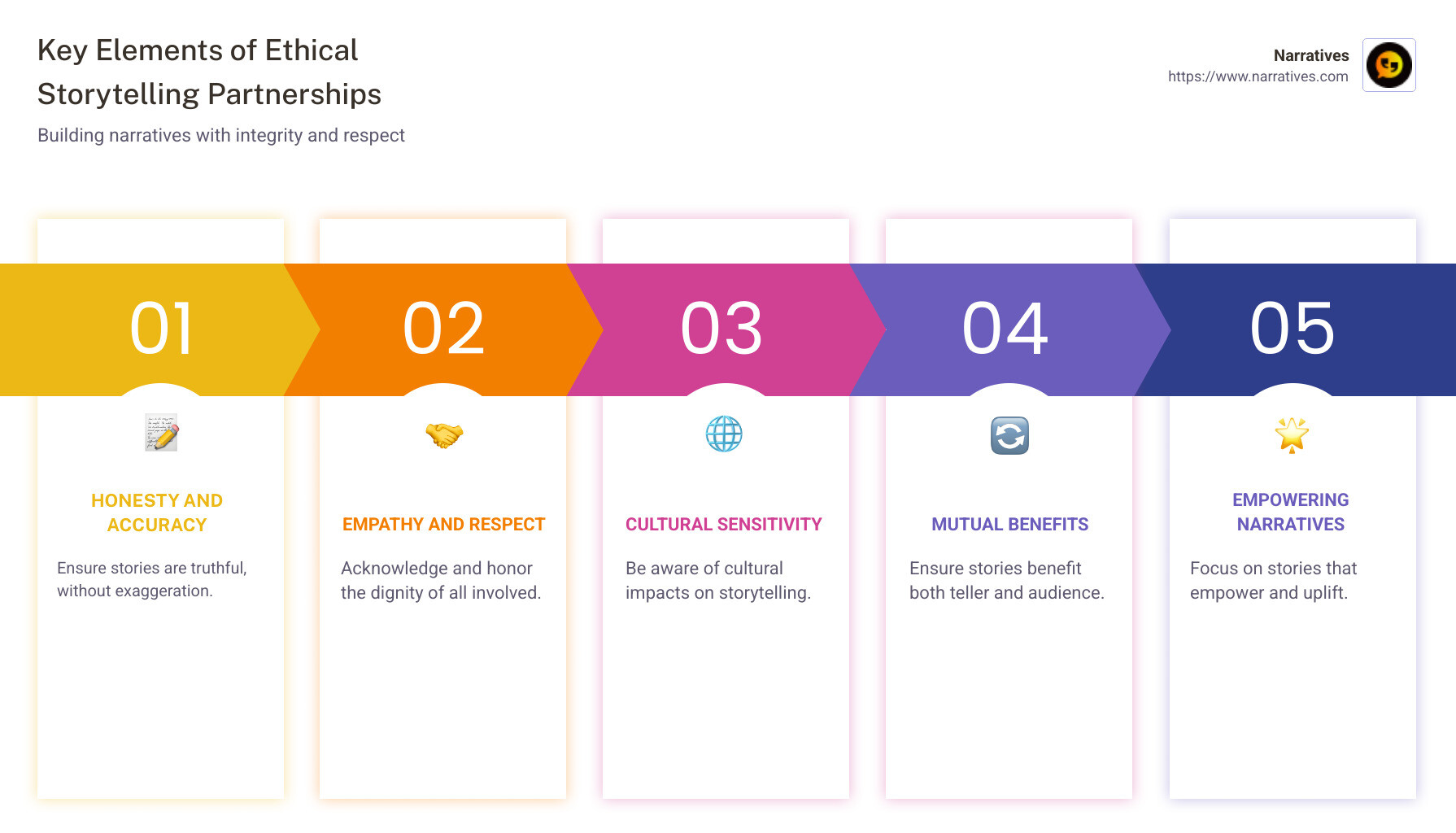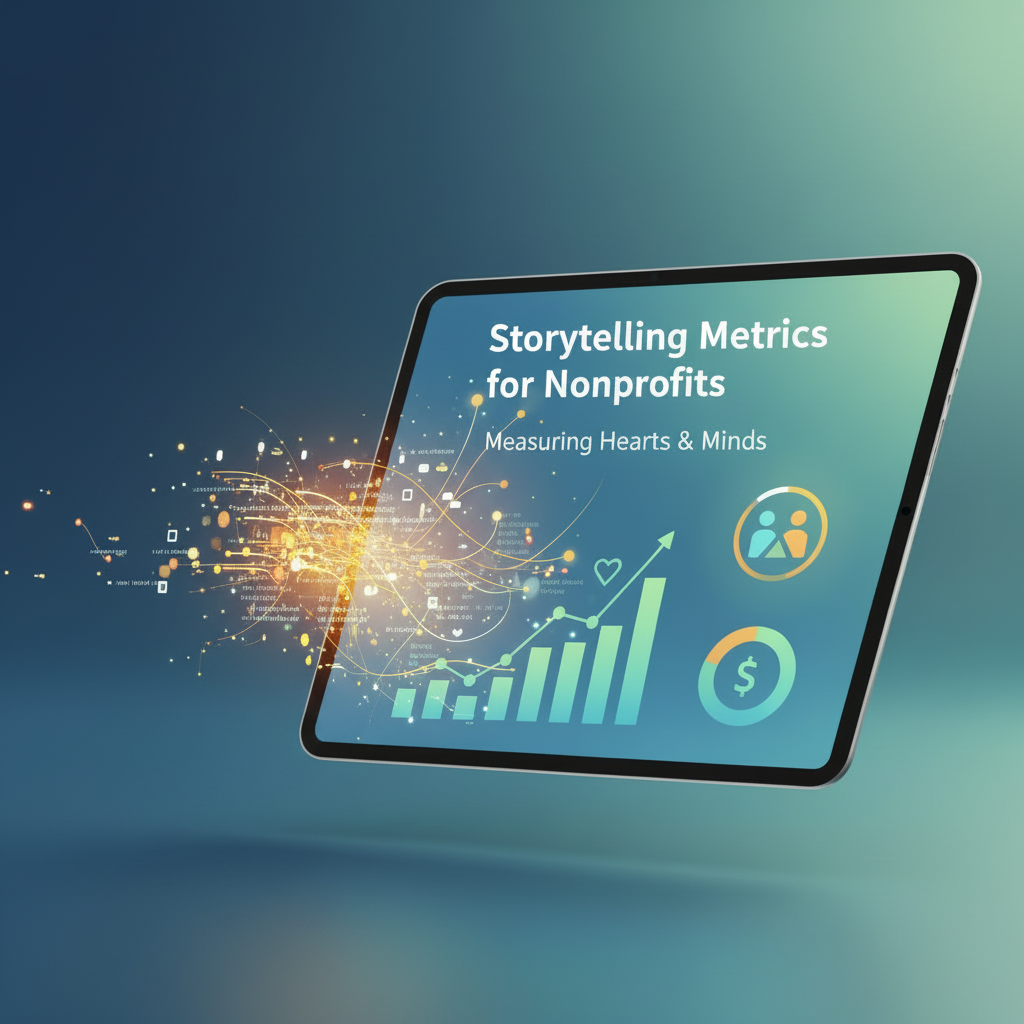Beyond the Story: Ethical Partnerships in Storytelling

Ethical storytelling partnerships harness the power of storytelling to create emotional connections, drive action, and foster deeper understanding around important causes. In an age where stories can greatly influence public perception, nonprofits bear a vital responsibility to ensure stories are told ethically.
Key Elements of Ethical Storytelling Partnerships:
- Honesty and Accuracy: Ensuring stories are truthful and not exaggerated for impact.
- Empathy and Respect: Acknowledging the dignity of those whose stories are shared.
- Cultural Sensitivity: Being aware of how stories might affect different communities.
- Mutual Benefits: Ensuring stories help both the storyteller and the audience understand and grow.
Storytelling in nonprofits isn't just about sharing achievements or challenges. It's about connecting with people genuinely and authentically. This responsibility extends to telling stories that honor the experiences and dignity of individuals involved.
In a world of media noise, ethical storytelling emerges as a guide. Not only does it help break down stereotypes, but it also builds trust and fosters long-lasting partnerships. Nonprofits that focus on ethical partnerships in storytelling can guide conversations towards real, impactful change, offering narratives that resonate more deeply with audiences.

Understanding Ethical Storytelling Partnerships
Ethical storytelling partnerships are about more than just sharing stories. They're about honesty, empathy, and mutual respect. These partnerships aim to uplift voices and create a narrative that is both truthful and impactful.
Honesty in Storytelling
Honesty is the cornerstone of ethical storytelling. It means presenting stories as they are, without exaggeration or manipulation. According to a study in the Journal of Social Work Values and Ethics, maintaining accuracy in digital narratives is crucial to uphold the integrity of the stories being told. When nonprofits share stories truthfully, they build trust and credibility with their audience.
Empathy and Respect
Empathy goes hand in hand with respect. It's about understanding and valuing the experiences of those whose stories are being told. A quote from the Journal of Community Safety and Well-Being emphasizes the importance of respecting differing expectations and perspectives in storytelling. By approaching stories with empathy, nonprofits can ensure that they are not only heard but also understood and appreciated.
Mutual Respect in Partnerships
Mutual respect is essential in any partnership, especially in storytelling. It involves recognizing the contributions of all parties involved and ensuring that the process is collaborative. As highlighted in the book True Storytelling: Seven Principles for an Ethical and Sustainable Change-Management Strategy, partnerships should be reciprocal, allowing both storytellers and audiences to gain insights and grow.
Cultural Sensitivity
Being culturally sensitive is a critical component of ethical storytelling. It requires an awareness of how stories might be perceived by different communities. The research indicates that cultural sensitivity can prevent the reinforcement of harmful stereotypes and ensure that stories are inclusive and respectful.
The Power of Ethical Storytelling
Ethical storytelling partnerships have the power to change perceptions and drive social change. By focusing on honesty, empathy, and mutual respect, nonprofits can create narratives that not only inform but also inspire action. These partnerships lay the groundwork for meaningful connections and long-lasting impact, guiding conversations towards a more inclusive and understanding world.

By prioritizing these key elements, nonprofits can ensure that their storytelling efforts are both ethical and effective, paving the way for partnerships that resonate deeply with audiences and foster genuine engagement.
Key Principles of Ethical Storytelling
Creating impactful narratives requires a foundation of ethical principles. Let's explore three key components: informed consent, cultural sensitivity, and a trauma-informed approach.
Informed Consent
Informed consent is about ensuring that those sharing their stories fully understand and agree to how their narratives will be used. It's not just a one-time agreement—it's an ongoing conversation.
Key Practices:
- Clearly explain the purpose and reach of the storytelling project.
- Obtain explicit permission for each stage, from interviews to publication.
- Offer narrators the chance to review drafts and make changes.
Engaging in this transparent process respects the storyteller's autonomy and builds trust.
Cultural Sensitivity
Cultural sensitivity involves understanding and respecting the diverse backgrounds of storytellers. This principle helps avoid reinforcing stereotypes and ensures inclusivity.
Strategies for Cultural Sensitivity:
- Research and understand cultural contexts before engaging.
- Use language and visuals that honor the storyteller's culture.
- Seek feedback from community members to validate representations.
By being culturally sensitive, stories become more authentic and respectful, resonating with a broader audience.
Trauma-Informed Approach
A trauma-informed approach recognizes the potential emotional impact of storytelling on narrators who have experienced trauma. It prioritizes their emotional well-being throughout the process.
Trauma-Informed Practices:
- Create a safe and supportive environment for sharing stories.
- Avoid pressing narrators to recount distressing details.
- Provide options and control over how their story is told.
This approach not only protects narrators from retraumatization but also enriches the storytelling experience by fostering a sense of safety and empowerment.
By integrating these principles, nonprofits can create ethical storytelling partnerships that are respectful, inclusive, and impactful. This sets the stage for genuine engagement and meaningful change.
Building Trust through Ethical Storytelling
Building trust is the cornerstone of ethical storytelling. It involves creating genuine connections, ensuring transparency, and empowering narrators. Let's explore how these elements can transform storytelling into a powerful tool for change.
Relationship Building
Relationship building is about more than just gathering stories—it's about creating authentic connections with narrators. This means engaging with them as partners, not just subjects.
Key Steps:
- Take time to understand narrators' perspectives and backgrounds.
- Approach each interaction with empathy and respect.
- Foster an environment where narrators feel valued and heard.
When narrators feel respected and understood, they are more likely to share their stories openly, leading to richer and more meaningful narratives.
Transparency
Transparency is crucial in maintaining trust. It involves being clear about how stories will be used and ensuring narrators are comfortable with every aspect of the process.
Transparency Practices:
- Clearly communicate the goals and potential reach of the stories.
- Keep narrators informed at every stage, from initial contact to publication.
- Be honest about the potential impact and limitations of the project.
By being open and transparent, organizations can build credibility and trust, making narrators feel more secure in sharing their stories.
Narrator Agency
Narrator agency emphasizes giving narrators control over their stories. This means they have the power to shape their narratives and decide how they are presented.
Empowering Narrators:
- Allow narrators to review and edit their stories before publication.
- Respect their choices about anonymity or identifying details.
- Encourage feedback and incorporate their suggestions into the final product.
Empowering narrators not only improves the authenticity of the stories but also reinforces the trust between narrators and organizations.
Building trust through ethical storytelling is not just a strategy—it's a commitment to honoring the voices of those who share their experiences. By focusing on relationship building, transparency, and narrator agency, ethical storytelling partnerships can thrive, leading to stories that inspire and drive meaningful change.
Ethical Storytelling in Practice
Putting ethical storytelling into practice means creating human-centered content, using visual storytelling, and crafting empowering narratives. Let's explore how these elements can improve the impact and authenticity of your stories.
Human-Centered Content
Human-centered content focuses on the needs and experiences of the people whose stories are being told. This approach ensures that the storytelling process respects and accurately represents the individuals involved.
Key Practices:
- Start by listening deeply to the narrators' stories. This "act of surrender" allows storytellers to learn and adapt to new insights, as emphasized in the Listening as Surrender Webinar.
- Ensure that narrators' motivations and concerns are at the heart of the story, as Paul Sternberg suggests, by asking questions that recenter the narrative on the audience.
By prioritizing the human element, stories become more relatable and impactful, fostering a deeper connection with the audience.
Visual Storytelling
Visual storytelling can bring narratives to life, making them more engaging and memorable. However, it's crucial to use visuals ethically, ensuring they respect the dignity and privacy of the narrators.
Guidelines for Ethical Visuals:
- Obtain informed consent for all images and visuals used, as highlighted in resources from Ethical Storytelling.
- Choose visuals that authentically represent the narrators and their stories, avoiding stereotypes or sensationalism.
When done right, visual storytelling can improve the emotional connection between the audience and the story, turning empathy into action.
Empowering Narratives
Empowering narratives give voice and agency to narrators, allowing them to shape and share their stories on their terms.
Ways to Empower Narrators:
- Provide narrators with the opportunity to review and suggest changes to their stories before publication.
- Respect their choices regarding anonymity or identity disclosure, ensuring they feel safe and in control.
- Highlight their strengths and achievements, focusing on resilience and hope rather than just challenges.
Empowering narratives not only create more authentic stories but also uplift the narrators, encouraging them to engage and share their experiences confidently.
By integrating human-centered content, visual storytelling, and empowering narratives, organizations can practice ethical storytelling that honors and amplifies the voices of those they serve. This approach not only enriches the storytelling process but also strengthens the impact and reach of the stories shared.
Frequently Asked Questions about Ethical Storytelling Partnerships
What is ethical storytelling?
Ethical storytelling involves sharing stories with honesty, empathy, and respect. It's about being truthful and considerate in how narratives are crafted and shared. This approach ensures that stories do not exploit or misrepresent individuals, communities, or cultures. Ethical storytelling respects the dignity and rights of those whose stories are being told, focusing on their experiences and perspectives.
How can nonprofits ensure ethical storytelling?
Nonprofits can ensure ethical storytelling by following several key practices:
Informed Consent: Always obtain permission from the individuals whose stories are being told. Make sure they understand how their stories will be used and have the option to opt out at any time.
Cultural Sensitivity: Be aware of cultural contexts and avoid reinforcing stereotypes. Allow stories to unfold naturally and respect the cultural nuances of the narrators.
Trauma-Informed Approach: Recognize that sharing personal stories can be triggering for some. Use a sensitive approach that prioritizes the well-being of the narrators.
Collaboration: Involve narrators in the storytelling process. Allow them to review and edit their stories to ensure accuracy and comfort.
Why are ethical storytelling partnerships important?
Ethical storytelling partnerships are crucial because they build trust and foster meaningful connections between nonprofits and the communities they serve. When stories are shared ethically, they can:
Amplify Voices: Empower individuals by giving them control over their narratives, leading to more authentic and impactful stories.
Break Down Barriers: Challenge stereotypes and misconceptions by presenting diverse perspectives and experiences.
Improve Credibility: Build trust with audiences, donors, and partners by demonstrating a commitment to integrity and respect.
Drive Social Change: Inspire action and support by connecting emotionally with audiences through genuine and relatable stories.
Ethical storytelling partnerships create a foundation for powerful, community-driven narratives that can lead to significant social impact.
Conclusion
At Narratives, we believe in the power of storytelling to drive meaningful social impact. Our focus on community-driven storytelling ensures that the voices of underrepresented communities are not only heard but also celebrated. We partner with nonprofits to craft ethical storytelling partnerships that are rooted in honesty, empathy, and mutual respect.
By prioritizing narrator agency and transparency, we build trust with both the storytellers and the audiences. This trust is crucial for creating narratives that resonate deeply and inspire action. Our approach to storytelling goes beyond just sharing stories; it's about empowering individuals and communities to take control of their narratives and use them as tools for social change.
Our work is guided by the principles of ethical storytelling. We ensure that every story is told with dignity and respect, avoiding exploitation or misrepresentation. This commitment allows us to amplify voices, break down barriers, and improve the credibility of the nonprofits we partner with.
When stories shape perceptions and drive change, our mission is to create content that not only informs but also transforms. By focusing on community-driven narratives, we aim to foster empathy, understanding, and ultimately, a more just and equitable society.
Together, through ethical storytelling, we can inspire change and make a lasting impact.


